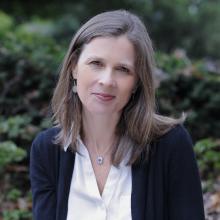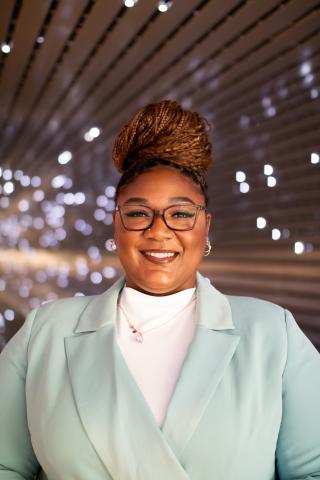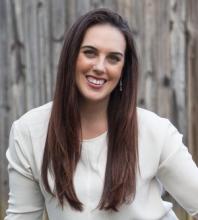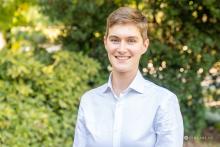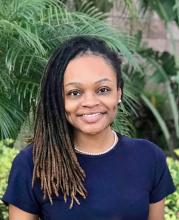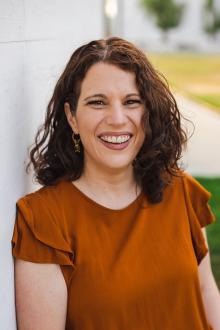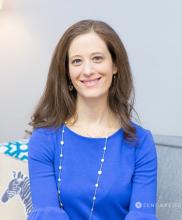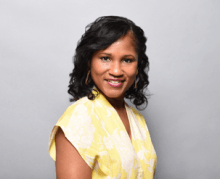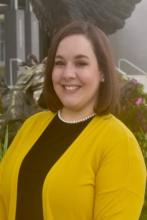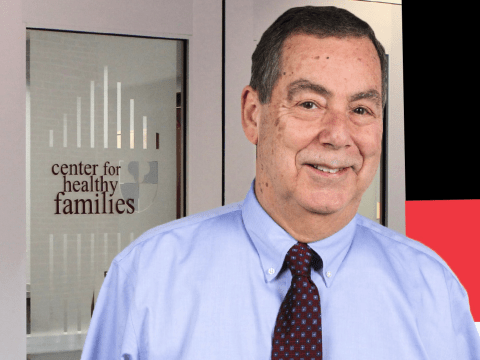Core Faculty
Program Director
Mariana Falconier, PhD
Professor, Family Science
Director, Couple and Family Therapy Master's Program
Dr. Mariana Falconier (she/her) is a Professor in the Department of Family Science and has been the CFT Program Director since May 2020, a year after joining the University of Maryland, College Park. She completed her master’s degree in Marriage and Family Therapy (MFT) and her doctoral degree in the same department. Before joining the University of Maryland, she was an Associate Professor at Virginia Polytechnic Institute and State University, serving first as Director of the Center for Family Services (2008-2016) and later as Director of the Master's Program in Marriage and Family Therapy (2017-2019). She has also served as director of outpatient mental health clinics at Washington Assessment and Therapy Services and Vesta, Inc. before joining Virginia Tech. Dr. Falconier, originally from Argentina, is a licensed psychologist in her home country and a licensed MFT both Maryland and Virginia. She has worked as a therapist for over 30 years and currently maintains a small private practice. Her clinical work in the U.S. has been dedicated to Latinx individuals, couples, and families and immigrants over a wide range of issues. Dr. Falconier has been an approved supervisor by the American Association of Marriage and Family Therapy since 2007. She holds a master’s degree in teaching and has been an educator since 1989. She has taught in several universities’ courses on developmental psychology, multicultural and diversity issues in MFT, couple therapy, and MFT theories and techniques, particularly postmodern approaches. Her research focuses on how couples cope with stress, primarily economic stress among low-income couples and immigration stress in Latinx couples. She has developed the evidence-based program TOGETHER, designed to help couples improve their communication, coping, and financial management skills and that has received federal funding of over $11 million dollars. Dr. Falconier has made a linguistic and cultural adaptation of the TOGETHER program for Latinx couples and has also led the adaptation of the program for LGBTQ+ couples, which she is currently pilot-testing and evaluating with Dr. Jessica Fish. These programs have enrolled over 1,300 couples, primarily low-income Black/African American and Latinx. Dr. Falconier’s work for these programs has been recognized in 2021 as recipient of the Excellence in Professional/Clinical Practice Award from the National Council for Family Relations (NCFR) and the George F. Kramer Practitioner of the Year Award from UMD School of Public Health. Dr. Falconier is also leading a research project on the Emotional Map of the Home with colleagues from the University of Szeged. Dr. Falconier has published and presented nationally and internationally, including an invitation to present on families’ stress and coping for Pope Francis and the Pontifical Academy of Social Sciences at the Vatican City. She is the leading editor of the book Couples Coping with Stress: A Cross-Cultural Perspective (2016), recipient of the 2018 CHOICE Outstanding Academic Title Award and co-author of the book Treatment Plans and Interventions in Couple Therapy: A Cognitive-Behavioral Approach (in press). She has been involved in multiple international collaborations with colleagues in Switzerland, Rumania, Italy, Hungary, Argentina, Pakistan, Hong Kong, and Chile among others and has served as editor of international journals. She is a member of COAMFTE Standards Review Committee.
Education and Training
2005 Ph.D., Family Studies
Department of Family Studies, University of Maryland, College Park
2002 M.S., Marriage and Family Therapy
Department of Family Studies, University of Maryland, College Park
1994 National Professor of English
Superior National Institute of Professorship Dr. J. V. Gonzalez, Buenos Aires, Argentina
1992 Licenciate in Psychology (equivalent to MA in Psychology)
School of Psychology, University of Buenos Aires, Argentina
Courses
- FMSC 641 - Couples Therapy: Theory and Techniques
- FMSC 658 - Supervised Clinical Practice of Marriage and Family Therapy
- FMSC 745 - Gender and Ethnicity in Family Therapy and Service Delivery
Falconier, M. K., & Jackson, J. (2020). Economic strain and couple relationship functioning: A meta-analysis. International Journal of Stress Management. http://dx.doi.org/10.1037/str0000157
Falconier, M. K., & Khun, R. (2019). Dyadic coping in couples: A conceptual integration and review of the clinical literature. Frontiers in Psychology. doi: 10.3389/fpsyg.2019.00571
Falconier, M. K., Rusu, P., & Bodenmann, G. (2019). Initial Validation of the Dyadic Coping Inventory for Financial Stress. Stress & Health, 35, 367-381. doi: 10.1002/smi.2862
Hequembourg Policay, R., & Falconier, M .K. (2019). Therapy dogs in couple and family therapy– A therapist’s perspective. Contemporary Family Therapy, 41, (79-91). DOI:10.1007/s10591-018-9472-z
Escobar, J., Falconier, M. K., & Muruthi, B. (2019). “Se llevaron al padre de mis hijos”: Latina mothers coping with the deportation of their partners. Journal of Family Therapy, 41, 277-301. doi: 10.1111/1467-6427.12227
Arshad, Z., & Falconier, M. K. (2018). The experiences of non-Muslim Caucasian licensed marriage and family therapists who work with South Asian and Middle Eastern Muslim clients. Journal of Family Therapy, 41, 54-79. doi: 10.1111/1467-6427.12203
Rusu, P. P., Hilpert, P., Falconier, M., & Bodenmann (2018). How economic strain affects support in couples: The mediating role of positive emotions. Stress and Health, 34, 320-330.
Rick, J.*, Falconier, M. K., & Wittenborn, A. (2017). Emotion regulation and relationship satisfaction in clinical couples. Personal Relationships, 24, 790-803. doi: 10.1111/pere.12213
Kanti, K. M.*, & Falconier, M. K. (2017). The experience of Asian Americans caring for their elderly parents. Journal of Cultural Diversity, 24, 73-83.
Falconier, M. K., Huerta*, M., & Hendrickson, E. (2016). Immigration Stress, Exposure to Traumatic Life Experiences, and Problem Drinking Among First-Generation Immigrant Latino Couples. Journal of Social and Personal Relationships, 33, 469-492. doi: 10.1177/0265407515578825
Falconier, M. K., Jackson, J., Hilpert, J., & Bodenmann, G. (2015). Dyadic coping and relationship satisfaction: A meta-analysis. Clinical Psychology Review, 42, 28-46.doi:10.1016/j.cpr.2015.07.002
Regan, T. W., Lambert, S. D., Kelly, B., Falconier, M. K., Kissane, D., & Levesque, J. (2015). Couples coping with cancer: Exploration of theoretical frameworks from dyadic studies. Psycho-Oncology, 24, 1605-1617. doi: 10.1002/pon.3854
Falconier, M.K. (2015). Together – A Couples’ Program to Improve Communication, Coping, and Financial Management Skills: Development and Initial Pilot-Testing. Journal of Marital and Family Therapy, 41, 236-250. doi: 10.1111/jmft.12052
Falconier, M. K., Nussbeck, F., Bodenmann, G., Schneider, H., & Bradbury, T. N. (2015). Stress From Daily Hassles In Couples: Its Effects on Intra-Dyadic Stress, Relationship Satisfaction, and Physical and Psychological Well-Being. Journal of Marital and Family Therapy, 41, 221-235. doi: 10.1111/jmft.12073
Quach, A. S., Epstein, N. B., Riley, P. J., Falconier, M. K., & Fang, X. (2015). Effects of parental warmth and academic pressure on anxiety and depression symptoms in Chinese adolescents. Journal of Child and Family Issues, 24, 106-116.doi:10.1007/s10826-013-9818-y
Mojta, C.,* Falconier, M. K., & Huebner, A. (2014). Fostering Self-Awareness in Novice Therapists Using Internal Family Systems Therapy. American Journal of Family Therapy, 42, 67-68. doi:10.1080/01926187.2013.772870.
Falconier, M. K., Nussbeck, F., & Bodenmann, G. (2013). Immigration stress and relationship satisfaction in Latino couples: The role of dyadic coping. Journal of Social and Clinical Psychology, 32, 813-843.
Falconier, M. K., Nussbeck, F., & Bodenmann, G. (2013). Dyadic coping in Latino couples: Validity of the Spanish version of the Dyadic Coping Inventory. Anxiety, Stress, & Coping, 26, 446-466. doi: 10.1080/10615806.2012.699045
Falconier, M. K., McCollum, E., Austin, J., Wainbarg, M., Hasbun, G., & Mora, S. (2013). IPV among Latinos: Community perceptions on help-seeking and needed programs. Partner Abuse, 4, 1-24. doi: 10.1891/1946-6560.4.3.356
Falconier, M. K. (2013). Traditional Gender Role Orientation and Dyadic Coping in Immigrant Latino Couples: Effects on Couple Functioning. Family Relations, 62, 269-283. doi:10.1111/fare.12002.
Austin, J., * & Falconier, M. K. (2013). Spirituality and common dyadic coping: Protective factors from psychological aggression in Latino immigrant couples. Journal of Family Issues, 34, 323-346. doi: 10.1177/0192513X12452252.
Finkbeiner, N. M., Epstein, N. B., & Falconier, M. K. (2013). Low Intimacy as a moderator between depression and relationship satisfaction. Personal Relationships, 20, 406-421. doi:10.1111/j.1475- 6811.2012.01415.x
Falconier, M. K., & Epstein, N. B. (2011). Female demand/male withdraw communication in Argentinian couples: A mediating factor between economic strain and relationship distress. Personal Relationships, 18, 586-603. doi: 0.1111/j.1475-6811.2010.01326.x.
Falconier, M. K., & Epstein, N. B. (2011). Couples experiencing financial strain: What we know and we can do. Family Relations, 60, 303-317. doi: 10.1111/j.1741-3729.2011.00650.x
Falconier, M. K. (2010). Female anxiety and male depression: The link between economic strain and psychological aggression in a clinical sample of Argentinean couples. Family Relations. Special Issue: Finances, families, and hard times, 59, 424-438. doi: 10.1111/j.1741-3729.2010.00613.x.
Falconier, M. K., & Epstein, N. B. (2010). Relationship satisfaction in Argentinean couples under economic strain: Mediating factors and gender differences in a dyadic stress model. Journal of Social and Personal Relationships, 27, 781-799. doi: 10.1177/0265407510373260
Epstein, N. B., & Falconier, M. K. (under contract). Treatment plans and interventions in couple therapy. Guildford.
Falconier, M. K., Randall, A. K. , & Bodenmann, G. (2016). Couples coping with stress: A cross-cultural perspective. New York: Routledge. 2018 CHOICE Outstanding Academic Title
Veiga, R., Lapidus, R., & Falconier, M. K. (1999). Mediacion educativa [Educational Mediation].Buenos Aires: ISIP.
Bodenmann, G., Falconier, M. K., & Randall, A. K. (2019). Dyadic coping: The systemic-transactional model. In J. Lebow, A. Chambers, & D. Breunlin, Encyclopedia of Couple and Family Therapy. Springer.
Epstein, N. B., & Falconier, M. K. (2019). Communication training in couple and family therapy. In J. Lebow, A. Chambers, & D. Breunlin, Encyclopedia of Couple and Family Therapy. Springer
Falconier, M. K. (2019). Norman Epstein. In J. Lebow, A. Chambers, & D. Breunlin, Encyclopedia of Couple and Family Therapy. Springer.
Falconier, M. K., & Epstein, N. B. (2019). Contingency contracting in couple and family therapy. In J. Lebow, A. Chambers, & D. Breunlin, Encyclopedia of Couple and Family Therapy. Springer. doi:10.1007/978-3-319-15877-8_78-1
Falconier, M. K., Kim, J., & Conway, A. (2018). TOGETHER: A Couple’s Model to Enhance Relationships and Economic Stability. In S. Donato (Ed), When "we" are stressed: A dyadic approach to coping with stressful events, NOVA Publisher.
Epstein, N. B., & Falconier, M. K. (2016). Shame in Couples’ Therapy. In J. Fitzgerald (Ed.), Foundations of Couples’ Therapy: Research for the Real World. New York: Routledge.
Falconier, M. K., Randall, A. K., & Bodenmann, G. (2016). Introduction. In M. K. Falconier, A. K., Randall, & G. Bodenmann (Eds.), Couples coping with stress: A cross-cultural perspective. New York: Routledge
Bodenmann, G., Randall, A. K., & Falconier, M. K. (2016). Coping in couples: The systemic transactional model (STM). In M. K. Falconier, A. K., Randall, & G. Bodenmann (Eds.), Couples coping with stress: A cross-cultural perspective. New York: Routledge.
Falconier, M. K., Randall, A. K., & Bodenmann, G. (2016). Cultural considerations in understanding dyadic coping across cultures. In M. K. Falconier, A. K., Randall, & G. Bodenmann (Eds.), Couples coping with stress: A cross-cultural perspective. New York: Routledge.
Falconier, M. K. (2016). Dyadic coping in Latino couples. In M. K. Falconier, A. K., Randall, & G. Bodenmann (Eds.), Couples coping with stress: A cross-cultural perspective. New York: Routledge.
Falconier, M. K., Bodenmann, G., & Randall, A. K. (2016). Conclusion. In M. K. Falconier, A. K., Randall, & G. Bodenmann (Eds.), Couples coping with stress: A cross-cultural perspective. New York: Routledge
Epstein, N. B., & Falconier, M. K. (2014). Cognitive-behavioral therapies for couples and families. In J. L. Wetchler & L. L. Hecker (Eds.), An Introduction to marriage and Family therapy (2nd ed.) (pp. 259-318). New York: Routledge.
Epstein, N. B., & Falconier, M. K. (2011). Shame in couple therapy: Helping to heal the intimacy bond. In R. Dearing & J.P. Tangney (Eds.), Shame in the therapy hour (pp. 167-192). Washington, DC: American Psychological Association
Baucom, D.H., Epstein, N., Kirby, J.S., & Falconier, M.K. (2010). Couple therapy: Theoretical perspectives and empirical findings. In D.H. Barlow (Ed.), Oxford handbook of clinical psychology (pp. 789-809). New York: Oxford University Press.
Wainstein, M., & Falconier, M. K. (2000). Intervenciones constructivas [Constructivist interventions]. In M. Wainstein (Ed.), Intervenciones con individuos, parejas, familias y organizaciones [Interventions with individuals, couples, families, and organizations] (pp. 97-115). Buenos Aires, Argentina: EUDEBA.
Tiara Fennell, PhD, M.S., LMFT
Assistant Clinical Professor, Family Science
Director, Center for Healthy Families
Dr. Tiara Fennell (she/her) is an Assistant Clinical Professor of Couple and Family Therapy in the Department of Family Science in University of Maryland’s School of Public Health and the Clinic Director for the Center for Healthy Families. She is a PhD graduate from the Human Development and Family Science: Marriage and Family Therapy from Virginia Tech, and has received her master’s in Marriage and Family Therapy from Northwestern University. As a scholar, Tiara is engaged in research focusing on the experiences of burnout for community mental health clinicians and developing clinical trainings to support African American families in therapy. More specifically, Tiara's research aims to apply a systemic focus to these different clinical areas in order to develop interventions that can better support clinicians and improve the quality of mental health care for all. Tiara Fennell is a Licensed Marriage and Family Therapist (LMFT) and an AAMFT-approved clinical supervisor candidate.
Education and Training
M.S., Marriage and Family Therapy, Northwestern University
Ph.D., Human Development and Family Science: Marriage and Family Therapy, Virginia Tech
Courses
- FMSC 640 Family Therapy: Theory and Techniques
- FMSC 642 Normative and Non-normative Individual and Family Development
- FMSC 658 Supervised Clinical Practice of Marriage and Family Therapy
- FMSC 485 Introduction to Family Therapy
Mona Mittal, PhD
Associate Professor, Family Science
Mona Mittal (she/her) is an Associate Professor in the Department of Family Science, School of Public Health, at the University of Maryland, College Park. She received her Ph.D. in Marriage and Family Therapy from Texas Tech University and a Masters in Clinical Investigation from the University of Rochester. As a clinical researcher, Dr. Mittal is engaged in prevention and intervention research aimed at improving the health outcomes of women with experiences of intimate partner violence (IPV). Her research interests include the physical, emotional, and sexual health of women with a specific focus on psychological trauma, interruption of the intergenerational cycle of violence, and physiological mechanisms linking IPV and adverse health outcomes across the lifespan. She is the recipient of a K01 Research Scientist Career Development Award funded by NIMH aimed at developing and testing an integrated HIV-IPV risk reduction intervention for women with experiences of IPV. Most recently, she has received NIH funding to extend the focus of her research to include couples. In her new project, Dr. Mittal is addressing the synergistic interactions between substance use, violence, and HIV/AIDS (SAVA syndemic) that have been closely linked with HIV acquisition in the African American population.
Education and Training
M.A., Clinical Investigation, University of Rochester Medical Center, 2014
Ph.D., Marriage and Family Therapy, Texas Tech University, 2002
M.A., Social Work, Tata Institute of Social Sciences (TISS),1998
B.S., Home Science, Lady Irwin College, Delhi University, 1996
Courses
- FMSC 432 Adult Development and Aging in Families
- FMSC 610 Research Methods in Family Science
- FMSC 651 Psychopathology in the Family Context
- FMSC 658 Supervised Clinical Practice of Marriage and Family Therapy
Mittal., M., *Porter, S. C., & *Skracic, I. (in print). Systemic interventions for prevention with HIV positives. In K. E. Wampler (Editor-in-chief). Handbook of Couple and Family Therapy. Wiley Publishing.
Stith, S., Mittal., M., & Spencer, C. (in print). Couple violence: In-depth assessment and systemic interventions. In K. E. Wampler (Editor-in-chief). Handbook of Couple and Family Therapy. WileyPublishing.
*Ballard, J., Witham, M., & Mittal, M. (2016). Partner violence among immigrants and refugees. In J. Ballard, E. Wieling, & C. Solheim (Eds.), Immigrant and Refugee Families (pp. 115-138). University of Minnesota Libraries Publishing, Minneapolis, MN.
Mittal, M., Maker. A. H., & Rastogi, M. (2004). South Asians in the United States: Developing a systemic and empirically-based mental health assessment model. In M. Rastogi and E. Wieling (Eds.), The voices of color: first person accounts of ethnic minority therapists (pp. 233-254). Sage Publications, Thousand Oaks, CA. Equal Contributors.
*Drew, L. B., Mittal., M., Thoma, M., Harper, C. C., Steinberg, J. (accepted) Intimate Partner Violence and Effectiveness Level of Contraceptive Selection Post-Abortion. Journal of Women’s Health.
Slopen, N., Zhang, J., Urlacher, S. S., DeSilva, G., & Mittal, M. (2018). Maternal experiences of intimate partner violence and C-reactive protein levels in young children in Tanzania. SSM- Population Health, 6, 107-115.
Mittal, M., *Resch, K., Nichols-Hadeed, C. A., Thompson Stone, J., Thevenet-Morrison, K., Faurot, C., Cerulli, C. (2018). Examining associations between strangulation and depressive symptoms in women with intimate partner violence histories. Violence and Victims, 33 (6), 1072- 1087.
*Schroder, A., Slopen, N., Mittal, M. (2018). Accumulation, Timing, and Duration of Early Childhood Adversity and Behavior Problems at Age 9. Journal of Clinical Child and Adolescent Psychology, 1-14.
Trabold, N., McMohan, J., Whitney, S., Alsobrooks, S., Mittal., M. (2018). A systematic review of intimate partner violence interventions: State of the field and implications for practitioners. Trauma, Violence, and Abuse.
Holland, M. L., Thevenet-Morrison, K., Mittal., M., Nelson, A. A., & Dozier, A. M. (2018). Breastfeeding and exposure to past, current, and neighborhood violence. Maternal and Child Health Journal, 22 (1), 82-91.
*Ali, B., Mittal, M., *Schroder, A., Ishman, N., Quinton, S., & Boekeloo, B. (2017). Psychological violence and sexual risk behavior among predominantly African American women. Journal of Interpersonal Violence. First Published July 27, 2017.
Mittal. M., Landau, J., Thevenet-Morrison, K., Cai, X., Gibson, L., *Schroder, A., Chaize, J., & Carey, M. P. (2017). An integrated HIV risk reduction intervention for women with a history of intimate partner violence: Pilot test results. AIDS and Behavior, 21(8), 2219-2232.
Mittal, M., *Schroeder, A., Thevenet-Morrison, K., & Carey, M. P. (2016). Condom use among abused women: An event-based analysis. Annals of Public Health and Research, 3 (2), 1039.
Blackmore, E. R., Mittal., M., Cai, X., Moynihan, J. A., Matthieu, M. M, & O’Connor, T.G. (2016). Exposure to intimate partner violence and proinflammatory cytokine levels across the perinatal period. Journal of Women’s Health, 25(10), 1004-1013.
*McGrane Minton, H. A., Mittal., M., *Elder, H., Carey, M. P. (2015). Relationship factors and condom use and women with a history of intimate partner violence. AIDS and Behavior 20 (1) 225–234.
McMahon, J. M., Chimenti, R., Fedor, T., Trabold, N., Mittal, M., & Tortu, S. (2015). Risk of intimate partner violence and relationship conflict following couple-based HIV prevention counseling: Results from the Harlem River Couples Project. Journal of Interpersonal Violence, 32(24), 3709-3734.
Sabri, B., Renner, L. M., Stockman, J. K., Mittal., M., & Decker, M. R. (2014). Risk factors for severe intimate partner violence and violence-related injuries among women in India. Women & Health, 54(4), 281-300.
Morse, D. S., Cerulli, C., Bedell, P., Wilson, J., Thomas, S., Mittal, M., Lamberti, J. S., Williams, G., Silverstein, J., Mukherjee, A., Walck, D., Chin, N. (2013). Meeting health and psychological needs of women in drug treatment court. Journal of Substance Abuse Treatment, 46(2), 150-157.
Mittal, M., Senn, T., & Carey, M. P. (2013). Fear of violent consequences and condom use among women attending a STD clinic. Women & Health, 53, 795-807.
Mittal, M., Stockman, J. K., Seplaki, C. L., Thevenet-Morrison, K., Guido, J., and Carey, M.P. (2013). HIV risk among women from domestic violence agencies: Prevalence and correlates. Journal of the Association of Nurses in AIDS Care, 24(4), 322-30.
Morse, D. S, Lafleur, R., Fogarty, C., Mittal, M., and Cerulli, C. (2012). They told me to leave: How health care providers address intimate partner violence. Journal of the American Board of Family Medicine, 25(3),333-342.
Mittal, M., Senn, T., & Carey, M.P. (2012). Intimate partner violence and condom use among women: Does the Information-Motivation- Behavioral Skills (IMB) Model explain sexual risk behavior? AIDS and Behavior, 16(4), 1011-1019.
Mittal, M., Senn, T., Carey, M. P. (2011). Mediators of the relation between partner violence and sexual risk behavior among women attending a sexually transmitted disease clinic. Sexually Transmitted Disease, 38(6), 510-515.
Landau, J., Mittal, M., & Wieling, L. (2008). Linking human systems: Strengthening individuals, families, and communities in the wake of trauma. Journal of Marital and Family Therapy, 34 (2), 193-209.
*Wang, M., Sandberg, J., * Zavada, A., Mittal, M., Gosling, A., * Rosenberg, T.,* Jeffery, A., & * McPheters, J. (2006).“Almost there”…Why clients fail to engage in family therapy: An exploratory study. Contemporary Family Therapy, 28 (2), 211 – 224.
Mittal, M. & Wieling, E. (2006). Training experiences of international doctoral students in marriage and family therapy. Journal of Marital and Family Therapy, 32(3), 369-384.
Mittal, M. & Hardy, K.V. (2005). A re-examination of the current status and future of family therapy in India. Contemporary Family Therapy, 27 (3), 285-299.
Mittal, M., & Wieling, E. (2004). The influence of therapists’ ethnicity on the practice of feminist family therapy: A pilot study. Journal of Feminist Family Therapy, 16(2), 1-24.
Mittal. M, & Wieling, E. (2002). Expanding the horizons of marriage and family therapists: Towards global interconnectedness. Journal of Feminist Family Therapy, 14(1), 53-63. *Equal Contributors.
Harris, S. M., Dersch, C. A., & Mittal, M. (1999). Look who is talking: Measuring self- disclosure in MFT. Contemporary Family Therapy, 21(3), 405-415
Amy Morgan, MS, PhD
Assistant Professor, Family Science
Dr. Amy Morgan (she/her) is an Assistant Professor of Couple and Family Therapy in the Department of Family Science in University of Maryland’s School of Public Health. She also serves as a supervisor for our current CFT students in The Center for Healthy Families. She received her PhD in Human Development and Family Science: Marriage and Family Therapy from Virginia Tech, and a master’s in Marriage and Family Therapy from the University of New Hampshire. As a scholar, Dr. Morgan is engaged in family science research focusing on the health, well-being, and resilience of families experiencing parental incarceration. In particular, Dr. Morgan’s research agenda seeks to understand factors that promote family resilience during parental incarceration in order to develop supportive interventions for formerly incarcerated individuals and their families. Most recently, Dr. Morgan was awarded grant funding from the American Association for Marriage and Family Therapy (AAMFT) Research and Education Foundation to investigate resilience processes after incarceration. Dr. Morgan is a Licensed Marriage and Family Therapist (LMFT) and an AAMFT-approved clinical supervisor. Dr. Morgan is also heavily involved in policy work, advancing research that explores mental healthcare policy and serving as a statewide legislative policy leader for organizations including AAMFT and the National Council for Behavioral Health.
Education and Training
Ph.D., Human Development and Family Science: Marriage and Family Therapy, Virginia Tech, 2020
M.S., Human Development and Family Science: Marriage and Family Therapy, University of New Hampshire, 2012
B.A., Psychology, University of New Hampshire, 2010
Courses
- FMSC 330 - Family Theories & Patterns
- FMSC 340 - Mental Health and Healing in Families
- FMSC 610 - Research Methods in Family Science
- FMSC 651 - Treatment of Emotional and Mental Disorders in Family Systems
- FMSC 658 - Supervised Clinical Practice of Marriage and Family Therapy
Morgan, A. A., Kosi-Huber, J. ††, Farley, T. M. ††, Tadros, E., & Bell, A. M†. (2022). Felons need not apply: The tough-on-crime era’s felony welfare benefits ban and its impact on families with a formerly incarcerated parent. Journal of Child and Family Studies. https://doi.org/10.1007/s10826-022-02400-3.
Tadros, E., Morgan, A. A., Durante, K. (2022). Criticism, compassion, and conspiracy theories: A thematic analysis of what Twitter users are saying about COVID-19 in correctional settings. International Journal of Offender Therapy and Comparative Criminology. https://doi.org/10.1177/0306624X221102847
Morgan, A. A., Fullen, M. C., & Wiley, J. (2022). A case of the tail wagging the dog: The Medicare mental health coverage gap and its impact on providers, beneficiaries, and communities. Submitted to the Journal of Mental Health Counseling Special Issue on Policies and Practice. https://doi.org/10.17744/mehc.44.1.04
Morgan, A. A., Arditti, J. A., Dennison, S., & Frederickson, S. (2021). Against the odds: A structural equation analysis of family resilience processes during paternal incarceration. International Journal of Environmental Research and Public Health. https://doi.org/10.3390/ijerph182111592
Morgan, A. A., *Thomas, M. E., & Brossoie, N. (2020). Trauma-informed care as a framework for addressing the opioid epidemic in Appalachia: An exploratory integrative phenomenological analysis. Journal of Rural Mental Health, 44, 156-159. doi:10.1037/rmh0000137.
Morgan, A. A., Arditti, J. A., Spiers, S., & Buechner-Maxwell, V. (2020). “Came for the horses, stayed for the men”: A Mixed Methods Analysis of Staff, Community, and Reentrant Perceptions of a Prison Equine Program (PEP). Journal of Offender Rehabilitation, 59, 156-176. doi:10.1080/10509674.2019.1706688.
Arditti, J. A., Morgan, A. A., Spiers, S., Buechner-Maxwell, V., & Shivy, V. (2020). Perceptions of rehabilitative change among incarcerated persons enrolled in a prison-equine program (PEP): Implications for Reentry into Family and Community Life. Journal of Qualitative Criminal Justice & Criminology, 8(2), 1-30. doi:10.21428/88de04a1.f0206951
Morgan, A. A., & Arditti, J. A. (2020). Incarceration and the family. In J. J. Ponzetti Jr., M. Blankemeyer, S. Horan, H. Lyons, & A. Shigeto. (Eds.), Macmillan Encyclopedia of Intimate and Family Relationships: An Interdisciplinary Approach. USA: Macmillan Reference.
Fullen, M. C., Wiley, J. D., & Morgan, A. A. (2019). The Medicare mental health coverage gap: How licensed professional counselors navigate Medicare-ineligible provider status. The Professional Counselor, 9, 310-323. doi:10.15241/mcf.9.4.310.
Wiley, J., Fullen, M. C., & Morgan, A. A. (2019). “Bearing the Burden”: Exploring the Implications of Licensed Professionals' Exclusion from Medicare on Rural Mental Health Disparities. Journal of Rural Mental Health, 43, 118-129. doi:10.1037/rmh0000119.
Landers, A., Morgan, A. A., Danes, S. M., & White Hawk, S. (2018). Does reunification matter? Differences in social connection to tribe and tribal enrollment among First Nations adults. Children and Youth Services Review, 94, 347-353. doi.org/10.1016/j.childyouth.2018.09.019
*Goodman, J., *Morgan, A. A., Hodgson, J., Caldwell, B. (2018). From private practice to academia: Integrating social and political policy into every MFT identity. Journal of Marital and Family Therapy, 44, 32 – 45. doi:10.1111/jmft.12298
Adjunct Faculty
Émilie Ellis, PhD, LMFT, is a couple and family therapist and instructor in the couple and family therapy. A graduate of the doctoral program in human development with emphasis in couple and family therapy at the University of Georgia, Dr. Ellis specializes in working with sexual and gender minority individuals, couples, and families with traumatic stress. Dr. Ellis’s research on related topics can be found in American Psychologist, Journal of Homosexuality, and Journal of Child and Adolescent Trauma.
Jasmine Ferrill, PhD (she/her) is a Clinical Fellow and Approved Supervisor in AAMFT and a Licensed Marriage and Family Therapist in the states of Virginia, Maryland, Georgia, and Illinois. Dr. Ferrill owns a virtual private practice where she provides culturally attuned services to couples and individuals employing evidence-based, systemic, and integrative approaches. She also serves as a supervisor for our current CFT students in The Center for Healthy Families. She is a graduate of Hampton University, Northwestern University, and Florida State University.
Erica R. Turner, MS (she/her) is the Associate Clinical Director in the Virginia Tech Marriage and Family Therapy Program in Falls Church, VA. Ms. Turner is a Licensed Marriage and Family Therapist, a Clinical Fellow of the American Association for Marriage and Family Therapy, and an AAMFT Supervisor Candidate. She supervises therapist interns in the Center for Family Services, the program’s onsite clinic, and also provides supervision for interns in offsite placements. Her clinical interests include working with couples who want to improve their connection and communication; adults who want to heal from highly difficult or abusive relationships; and providing tools to children and adults to manage anxiety. Ms. Turner is the owner of a private psychotherapy practice in Northern Virginia. She is passionate about advancing the mental health field and increasing public engagement in mental health and relationship topics. To that end, she is the co-founder of Therapy is Not a Dirty Word, an events and advocacy program that works to bridge the gap between therapists and the public. Ms. Turner lives in Washington, DC with her husband, their two cats, and their dog.
Adjunct Faculty / Clinical Supervisors
Zack Berman, Ph.D., M.S., LCMFT, CST is a Licensed Clinical Marriage and Family Therapist, Certified Sex Therapist, and AAMFT Approved Supervisor who sees clients in Rockville, MD as a member of a private group practice. After five years as a rehabilitation counselor supporting clients with severe mental illness diagnoses in a community mental health setting, Zack graduated from the University of Maryland's Couple and Family Therapy program and went on to complete his Ph.D. in the Department of Family Science. His clinical interests center on couples therapy, sex therapy, and men's mental and sexual health, and he has extensive experience working with diverse clientele in LGBTQ+, consensually non-monogamous, and kink communities. Zack's preferred models are Bowen Family Systems, Structural Family Therapy, Cognitive Behavioral Therapy (CBT) and Dialectical Behavior Therapy (DBT), and Emotion-Focused Therapy (EFT). He frequently engages clients in spontaneous experiential exercises, blending psychoeducation with a strengths-based approach to help them achieve their goals.
Liann Seiter Brown, MS, LCMFT (she/her) is a Licensed Clinical Marriage and Family Therapist in the state of Maryland and District of Columbia who works with clients in private practice. She is a Clinical Fellow of the American Association for Marriage and Family Therapy, and an AAMFT supervisor candidate. She also serves as a supervisor for our current CFT students in The Center for Healthy Families. Ms. Seiter received a bachelor’s degree in marriage, family, and human development from Brigham Young University (BYU) a master’s degree in Sociology from BYU, and a master’s degree in couples and family therapy from the University of Maryland at College Park. Ms. Seiter is also trained as a massage therapist, yoga teacher, and birth doula. She enjoys working with children, adolescents, and emerging adults struggling with a wide range of issues including anxiety, depression, emotional dysregulation, and grief.
Stella Li, MMFT, LCMFT (she/her) is a Licensed Clinical Marriage and Family and an AAMFT Approved Supervisor Candidate in Maryland. Stella graduated from Converse College’s Marriage and Family Therapy program; she has experience collaborating with co-therapists in high school, carceral, and community clinic settings. Stella currently works with individuals and couples in a private practice. Her areas of interests include neurodivergence, LGBTQ+ populations, and deconstructing dominant narratives that negatively impact relationships. Stella enjoys using experiential and narrative models to help clients identify the ‘shoulds’ in their lives, and shift their focus to ‘wants' and 'needs’.
Diana Mayer, MS, LCMFT (she/her) is an AAMFT Clinical Fellow and supervisor candidate with over twenty years of experience working with children and families. Diana owns a private practice in Bethesda, MD where she specializes in childhood and adolescence anxiety and depression, parenting, and acculturation. She also works for the World Bank Counseling Unit. Diana’s preferred models are Cognitive Behavioral Therapy, Narrative, and Structural Family Therapy. She received her Bachelor’s degree in Clinical Psychology in Venezuela, and her Master’s degree in Marriage and Family Therapy by the University of Rochester, NY.
Clinical Supervisors
Sabrina Cermeno, (she/her), is a Licensed Clinical Marriage and Family Therapist in MD and an AAMFT Approved Supervisor Candidate. Sabrina graduated from UMD’s CFT program in 2021 and fondly remembers her time there. Sabrina has worked in private practice in Bethesda, as well as group therapy workshops in various MCPS schools through Identity. Sabrina is passionate about working with recently arrived immigrant youth and families, the BIPOC community, and the LGBTQ+ community in English and Spanish. Sabrina specializes in attachment-based interventions, life transitions, acculturation, trauma, anxiety, and couples counseling. Sabrina enjoys using a strengths-based approach, narrative, experiential, and EFT.
Samantha Congdon is a Licensed Marriage and Family Therapist with over a decade of experience supporting children, adolescents, young adults, and adults through individual, couples, and family therapy. She provides teletherapy across five states, offering accessible and compassionate care grounded in trauma-informed, neurodivergent-affirming, and gender-affirming principles.
Her clinical approach is rooted in Narrative Therapy, where she helps clients re-author the stories they’ve been told or have internalized; shifting away from problem-saturated narratives toward those that highlight agency, resilience, and meaning. She is also a certified Intuitive Eating clinician, passionate about helping clients heal their relationship with food and body. She supports those struggling with disordered eating and body image issues through a non-diet, mind-body framework that promotes self-trust and body respect.
She integrates DBT (Dialectical Behavior Therapy) skills to support emotional regulation, distress tolerance, and interpersonal effectiveness. She also draws from a range of modalities, including Internal Family Systems (IFS), Cognitive Processing Therapy (CPT), CBT, Gestalt, and mindfulness-based practices. As a certified yoga teacher, she incorporates breathwork and relaxation techniques to support those managing anxiety, depression, and sleep issues.
Her work is deeply collaborative and systemic. She views mental health through the lens of each person’s environment, relationships, identities, and lived experiences. Whether you’re navigating trauma, life transitions, neurodivergence (such as ADHD or Autism), OCD, or self-esteem challenges, she strives to create a space where you feel seen, safe, and empowered.
Vickye Hayter is a licensed Clinical Marriage and Family Therapist and a registered nurse with over 25 years of experience in health care. She is the founder and owner of a private practice in Kensington, MD, where she works with individuals, couples, and families from diverse backgrounds.
Grounded in a client-centered approach, Vickye integrates various evidence-based therapy models— including Emotionally Focused Therapy (EFT), Cognitive Behavioral Therapy (CBT), and narrative therapy— to help clients navigate challenges related to anxiety, depression, life transitions, and trauma.
Her extensive health care background spans roles as a business consultant, public health nurse, health educator, and maternal-child health specialist in a variety of settings. This broad experience gives her a unique, systemic perspective on healthcare delivery and its impact on health outcomes.
Vickye earned a Bachelor of Science in Nursing and a Master of Health Science from the University of Arkansas, a Master’s in Couple and Family Therapy from the University of Maryland, and a PhD in Nursing from George Mason University. Her research focuses on trauma-informed care.
Jannel Thomas, MS, LCMFT, (she/her) is a Licensed Clinical Marriage and Family Therapist, an AAMFT Approved Supervisor Candidate, and a Board Approved Supervisor. She completed her studies at the University of Maryland-College Park with a Bachelors of Arts degree in Psychology and Family Science and a Master of Science degree in Couples and Family Therapy. Jannel currently sees children, adolescents, and families at a local behavioral health clinic in Montgomery County, Maryland. Jannel also sees clients in Columbia, MD as a member of a private group practice. Her clinical interests include anxiety, grief, depression, infidelity, couples’ communication, emotion regulation, and working with those in the LGBTQ+ community. Jannel’s preferred models are cognitive behavioral therapy and emotion focused therapy, but will use a collaborative, strengths-based approach to help clients achieve their goals and overcome challenges.
Christie Zell, LCMFT, DBT-C (she/her) is a Board-Approved and AAMFT-Approved Supervisor in the State of Maryland. She has over 5 years of supervising LGMFT's and LGPC's, and 3 years supervising Graduate students here at the Center for Healthy Families. In her clinical work, Christie works from a postmodern approach while also centering tenets of Dialectical Behavior Therapy (DBT) and Acceptance and Commitment Therapy (ACT). Christie practices Supervision from a developmental perspective allowing for the Supervision relationship to change over time from that of a teacher to a more collegial approach. In work with her supervisees, Christie looks to build on areas of confidence as they find their clinical voices while also supporting them through areas of growth. Radical genuineness is a central theme in ways Christie connects with clients, colleagues, and supervisees. Christie hopes her supervisees feel seen for who they are inside and out of the therapy room, that they challenge prior beliefs of what therapy "should" look like, and that they grow into their therapist identity feeling supported and confident.
Staff
Sarah Walker (she/her) is the Program Administrative Specialist for the MS, Couple and Family Therapy program and The Center for Healthy Families clinic at the University of Maryland, College Park. She holds a Master's degree in Psychology from Purdue University Global, a Bachelor's degree in Journalism/Communication from Ole Miss, and an Associate's degree from the Mississippi Gulf Coast Community College. She began her career in higher education administration in 2017 and is passionate about student success. She is a native of the Mississippi Gulf Coast and enjoys reading, board games, and traveling with her spouse, her teenager, and her dog.
Please contact scwalk@umd.edu with any questions about the program.
